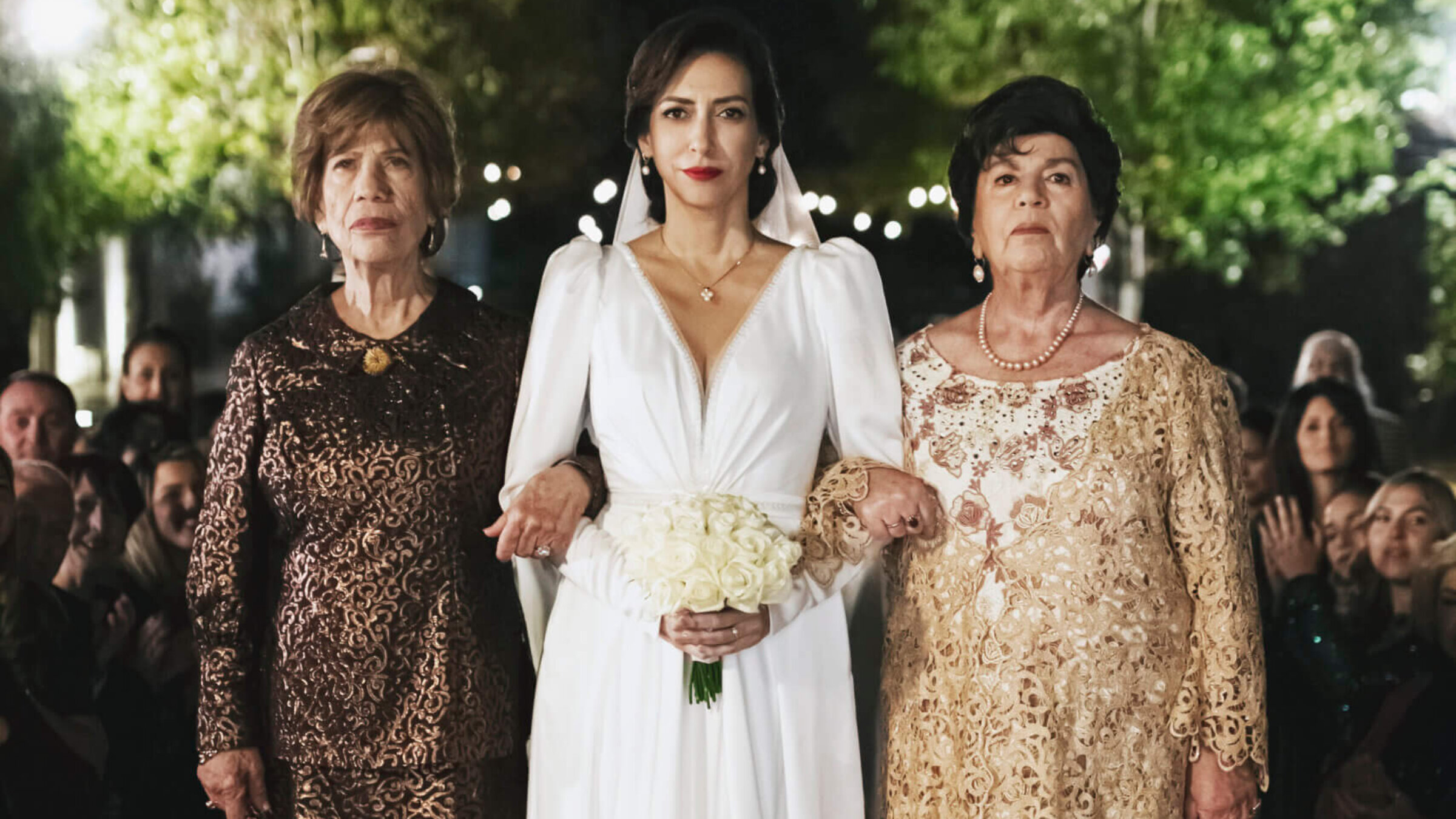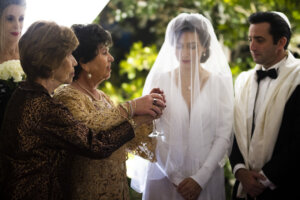Critically acclaimed Israeli film offers great performances, family tension, and nostalgia for an unsavory past
Ayelet Menahemi’s ‘Seven Blessings’ won 10 Israeli Oscars, including best picture

Seven Blessings was Israel’s official entry to the Academy Awards. Courtesy of Israel Center Film Festival
Editor’s note: This review includes major spoilers for the film.
Though it relies on familiar narrative elements like culture clash, family conflict and festering resentments that culminate in explosive confrontation, Ayelet Menahemi’s Seven Blessings opens the window on a little-known tradition that until fairly recently existed among some Moroccan Jews and others of Mizrahi descent. As the film tells it, since a barren wife ran the risk of being dumped by her husband, then shamed and shunned as a slut when she became a divorcee, her fertile sister, usually the mother of a large flock, might gave away her young or even infant daughter (but never a son) to her infertile married sister.
Set in the ’90s, the movie, which won 10 Ophir Awards (the Israeli Oscars), including best picture, and is the opening night selection at the Israel Center Film Festival, is for the most part a fast-paced, visually compelling, gripping narrative. The acting is superb across the board.
Forty-year-old Moroccan-born Marie (Reymonde Amsallem, who also served as co-writer along with Eleanor Sela, another actor in the film) has returned to Israel from France for her wedding with her French Jewish fiance and his wholly assimilated Parisian parents. Inching down the aisle, Marie is tightly flanked on either side by her biological mom, Hana (Tikva Dayan), and her aunt, Mama Gracia (Rivka Bahar), to whom she was gifted. The tense emotional cross currents are palpable.
Marie’s extended Moroccan family is large, loud, festive and joyous. Yet cracks are surfacing among these die-hard celebrants, particularly Marie’s alcoholic brother who is noisily drinking away throughout the wedding and at the “Seven Blessings” ritual.
The latter entails seven days of dinners and benedictions in the week immediately following the nuptials. These lavish repasts, overflowing with food, raised voices, and contentious talk, and lasting for hours, are hosted by various family members — it’s not always easy to determine what the relationships are and who’s who.
The film is ingeniously structured around the seven dinners, each event boasting its own idiosyncratic flavor, yet building on the mood, evolving relationships, and growing dissension that has been established at the previous culinary gatherings.
Marie’s mother and father in law are thoroughly turned off by the raucous family and what they view as their primitive sacraments. After a point, dad-in-law can’t take it anymore and returns to Paris. But Marie suffers the most as each consecutive repast further intensifies conflicts with her entire family, but mostly with her biological mother who gave her away, essentially abandoning her, then much later, for reasons that are not entirely clear, retrieved her as if she were an inanimate object. By that time, Marie had lived many years with her aunt and uncle and viewed them as her parents. At no point during any of the transactions was she asked what she wanted or how she felt. Mama Gracia was no better, also handling her like a thing to be acquired or cast aside.

Marie’s siblings are bitter, too. They envy Marie — an only child residing with her financially comfortable aunt and uncle — who has had all the personal attention and material advantages that they lacked. Issues of female autonomy and agency are beyond their imagination and education.
Excessive amounts of food, and its preparation, display and relentless consumption, is a recurring theme. At times it’s enticing, at other points repellent, oftentimes both. Love — familial, romantic, and sexual — is also a key theme and is, at times, brilliantly rendered. There’s a particularly authentic and erotic lovemaking scene between Marie’s sister and her husband, who arouses her passion even as she regards him as a blue collar lug whom she wishes she had the wherewithal to divorce. What makes the snippet so extraordinary is its wholly credible existence within a contradictory troubled marriage.
The relationships between and among Marie and her two mothers are, of course, the film’s linchpin. In an excruciating blow-up, Mama Gracia confesses to Hana that, contrary to what everyone believes, she was not infertile; her late husband was. But her devotion for him was so great that she took the blame in order to protect him from the stigma. Her compassionate lie was at once courageous and brutal as it destroyed her family. The revelation is shocking.
I do, however, have a few objections, starting with Marie’s inability to move on. Her outburst at the final dinner, as she demands that her mother beg for forgiveness, rings false. That a woman whose current life is as full and successful as Marie’s would continue to adhere to that degree of torment and recrimination and, more to the point, publicly voice it at a family party given in honor of her marriage, strains plausibility.
According to the film’s creators, all women, the film is intended as a farewell valentine to a flawed, but fundamentally goodhearted, vanishing world. Indeed, they suggest, there are parallels between transferring ownership of a daughter and surrogacy. How fitting that one of Marie’s cousins is about to have a child that way. For this viewer the implied parity is pushing it, and the affection for this family’s universe is not altogether convincing; its customs, values and interrelations register as both claustrophobic and imprisoning.)
Yet, the epilogue, set some time in the future, stunningly recasts everything that has transpired. Mama Gracia is dead and Hana is suffering from some form of dementia. She remembers nothing and recognizes no one short of Marie, who arrives on the scene after a year’s absence. Hana is benign and grateful and so happy when Marie sits down to paint her (Hana’s) nails in a bright red color. Suddenly, life with all its disappointments and traumas and pain seems fragile and transitory. The existential realities pack an emotional wallop.
A message from our Publisher & CEO Rachel Fishman Feddersen

I hope you appreciated this article. Before you go, I’d like to ask you to please support the Forward’s award-winning, nonprofit journalism so that we can be prepared for whatever news 2025 brings.
At a time when other newsrooms are closing or cutting back, the Forward has removed its paywall and invested additional resources to report on the ground from Israel and around the U.S. on the impact of the war, rising antisemitism and polarized discourse.
Readers like you make it all possible. Support our work by becoming a Forward Member and connect with our journalism and your community.
— Rachel Fishman Feddersen, Publisher and CEO





























